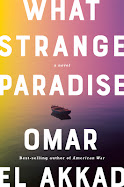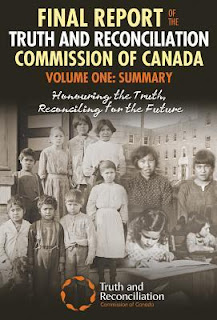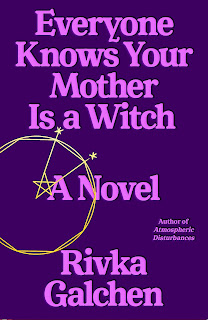I've highlighted ten favourites here, out of the 38 books that I read in August. If you are a fan of graphic novels, this post is for you, because five out of the ten are in comics format. Read on!
In. by Will McPhail
An introverted, self-centred cartoonist named Nick struggles to make authentic connections with the people around him. When he does, the graphite pencil art blooms into glorious watercolours; I rejoiced with every breakthrough. Nick's performance of life-as-he-believed-was-expected-of-him, plus full-page gags about pretentious coffee shops, kept me giggling, while family and relationship drama added a more serious undertone. This Scottish graphic novel is both funny and sad and I loved it.
Cyclopedia Exotica by Aminder Dhaliwal
This book opens with pages laid out as if it‘s a reference encyclopedia, with pointed humour in the seemingly-dry entries. Example: “There were few job opportunities for Cyclopes beyond herding. Publishers turned away Cyclopean authors, while many popular Two-Eyed authors wrote stories featuring Cyclopean leads.” Afterwards, the content switches to slice-of-life comics panels following a diverse group of characters, some of them queer.
Cyclops have assimilated into Two-Eyes society, but their daily lives are a series of micro-aggressions and other challenges, in addition to quotidian joys. Representation versus exploitation in consumer marketing, is one example. This uplifting graphic novel presents a witty satire of external and internal prejudices faced by anyone who is different from the mainstream.
Sometimes there‘s a story we tell ourselves and sometimes a story is told about us. Some parts of our story define us. But nuance and humanity is lost in the encyclopedias.
Menopause: A Comic Treatment edited by MK Czerwiec
This is excellent! Twenty-nine cartoonists with a wide variety of styles write about different aspects of menopause. I really appreciate the diversity because we don‘t all experience menopause the same way. Among the queer contingent of contributors are: Jennifer Camper, KC Councilor, Leslie Ewing, Ellen Forney, Keet Geniza, AK Summers and Kimiko Tobimatsu.
Delicates by Brenna Thummler
I didn‘t read the first graphic novel volume Sheets, about a middle school girl and her ghost friends, but I sure enjoyed this second volume. The topic of being bullied for being different versus being your own weird self is delicately handled, and a neurodiverse character is well portrayed. True friendship is precious. Expressive, colourful art.
The Tea Dragon Tapestry by Kay O'Neill
Third in the gentle LGBTQ fantasy graphic novel Tea Dragon series from New Zealand, the characters are compassionate and the message of friendship and self worth is reassuring. “You are already whole.” Adorable comics for all ages.
Nature Poem by Tommy Pico
Tommy Pico‘s book-length poem embraces multiple identities—Indigenous, urban, queer—with a voice that‘s urgent, angry, sorrowful and intimate. Gay club culture, online dating apps and colonialism are just some of the topics addressed with wit and quicksilver mood changes. A quick read—75 pages—and so very approachable.
oh, but you don‘t look very Indian is a thing ppl feel comfortable saying to me on dates.
What rhymes with, fuck off and die?
Mirrors love attention.
Like everyone.
Who even wants to go into space?
I fucking hate traveling
I don‘t like thinking abt nature bc nature makes me suspect there is a god.
[…]
God wants everything, n I‘m like God—you, I‘m sorry, but you are too much of a time commitment. I have a work thing. It‘s not you, it‘s me.
Razorblade Tears by SA Cosby
Audiobook [12 hr] read by Adam Lazarre-White
“Folks like to talk about revenge like it‘s a righteous thing, but it‘s just hate in a nicer suit.” I agree 100% with this sentiment, voiced by one of the main characters, in an audiobook I loved—even though it's a violent action thriller about vigilante justice. What makes it so good? The character nuances and growth, the complexities of the issues explored—like racism, homophobia and transphobia, and the consequences that are suffered. Plus, it is wickedly funny.
Ike spied a silver BMW in the rearview mirror, driven by a woman with the most severe I-want-to-speak-with-the-manager haircut he‘d ever seen. She zipped by them doing at least 30 mph, like she had some dalmatians in the trunk that she needed to make into a coat.
His blond hair was slicked back with so much product, a fly would break its neck trying to land on it.
What Strange Paradise by Omar El Akkad
Audiobook [7 hr] read by Dion Graham
The gripping, devastating tale of a 9-year-old Syrian refugee, only survivor from a boatload of desperate people. His safety is not assured, even after washing up on a tourist beach on a Greek island. Alternating before and after chapters build empathy and suspense.
Vänna could not help but think of ancestry as a kind of shackle one could never fully unclasp. An umbilical cord that, no matter how deeply cut, could never be severed.
Every man you ever meet is nothing but the product of what was withheld from him, what he feels owed.
“You‘ve got a storybook view of the world.”
Maher shrugged. “Books are good for the soul,” he said. “Books will wean you off cruelty.”
“And what will you be left with then?” Mohamed asked.
Farewell, My Orange by Kei Iwaki
Translated by Meredith McKinney
A slim, emotionally-affecting and hopeful novel told in the alternating viewpoints of two immigrants to Australia. Salimah is an African refugee with two young sons. Sayuri is the highly-educated wife of a Japanese academic. The two meet at an ESL class and become friends. This story held me spellbound and continued to disperse gloom even after I had finished reading it.
Beneath a blue sky, learning to write under a great tree that sheltered her instead of a classroom roof. The first letters she had written with her finger in the sand. Letters that a man‘s feet had trampled. The land where she lived, her family, her friends—all taken from her. And after that, the simple prayer that she live another day to greet the sun again.
While one lives in a foreign country, language‘s main function is as a means of self-protection and a weapon in one‘s fight with the world. You can‘t fight without a weapon. But perhaps it‘s human instinct that makes it even more imperative to somehow express oneself, convey meaning, connect with others.
The Promise by Damon Galgut
A dysfunctional white South African family gathers for four funerals over the course of three decades. I love the chatty authorial voice, which slips nimbly in close third-person from character to character within single paragraphs. Clever turns of phrase—ie describing a lady as “much in favour of perms and cardigans”—kept me smiling, while the deeper thread witnessing social and political change touched my heart. I would be very pleased to see this win the Booker prize, a couple of months from now (November 3, 2021).
Will people feel sorry for her all day because her mother has become that word? She feels ugly when she cries, like a tomato breaking open, and thinks that she must get away, away from this horrible little room with its parquet floor and barking Maltese poodle and the eyes of her aunt and uncle sticking into her like nails.
Her new faith, which she experiences as a kind of waterproof garment she's buttoned down over herself, doesn't stop her from acting on her fears and desires, but it provides a way of washing them off afterwards. She will receive her penance and the karmic clock will be reset again to zero and she will swear to the priest that she will follow his instructions, that this is the last, last time that she will ever stray, and she will deeply mean it.



























